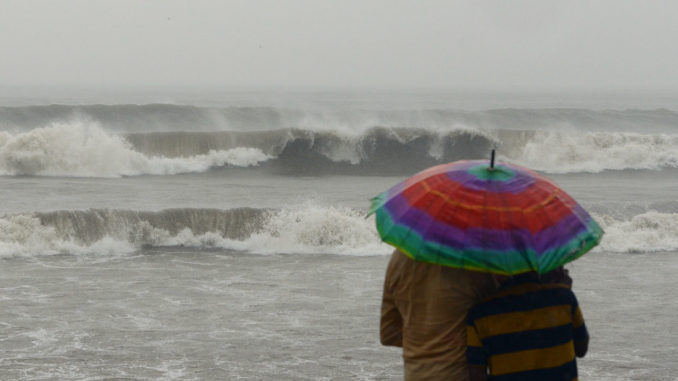
The general perception about sea level rise even in global context should not ne taken lightly as one of those natural occurrences or acts of God that would come and go casually. In our milieu, it should be taken that it could induce ocean surge that may wreck Lagos, and other coastal cities in Nigeria and beyond. Such highly probable scenario has strengthened the fears of climate scientists that the world may be headed for disaster of catastrophic dimension except urgent measures are taken to mitigate the impacts of climate change, now, evidently ravaging humanity around the world.
The frequency of climate-related disasters has increased with the destructive power of hurricanes and typhoons doubling. Unprecedented flooding is wrecking havoc in many places including high impact ones in North Carolina, United States and the Philippines in Asia: Peoples, property and infrastructure are affected. The blind force of nature is manifesting without restraint.
Against this backdrop, the Nigerian Conservation Foundation (NCF), the other day raised the alarm that Lagos and other coastal cities that are less than one metre above sea level could be submerged by 2050 if the surge continues. This alarm is not new.
NCF’s submission corroborates with a projection made by United Nations scientists working on Climate Change, who after extensive studies predicted that there is the likelihood of the world’s oceans rising by one metre between 2030 and 2050.
Consequently, cities that are less than one metre above sea level are under threat of submergence. Lagos and many Nigeria’s coastal towns and cities are in this category besides our oil industry infrastructure.
According to the NCF Director-General, Dr. Muhtari Aminu-Kano who made the pronouncements, part of the reasons for ocean encroachment and beach erosion were human activities around the coastlines.
Noting that sea level rise is a looming danger, he said the problem should not be for Lagos alone to carry but a national problem that should involve the Federal Government.
Sadly enough, the Federal Government is standing aloof without showing enough concern for the impending disaster. Nothing has been done to protect Lagos and the other coastal towns, especially, those housing the country’s oil industry facilities, from possible destruction in the event of a violent ocean surge.
President Muhammadu Buhari’s promise in 2015, at a summit on Climate Change at the UN headquarters in New York, that Nigeria was committed to the adoption of a legally binding universal agreement to mitigate climate change should be matched with concrete action on the home front.
It is curious that there has been no commitment on a critical issue as Climate Change. There have been no practical steps being taken to mitigate the impacts on vulnerable people and ecosystems. The situation of Lagos, Nigeria’s commercial capital, almost at sea level, exposes the city to ocean surge that exacerbates during the rainy season. Last year was a sign that submergence was possible as part of Ikoyi and Victoria Island experienced unprecedented flooding.
Good enough, the Lagos State Government is not folding its arms over the matter. Worried by the high incidence of ocean surge on its coastline, the State Government, not long ago, reportedly earmarked N36 billion to tackle the menace. It is hoped that the fund earmarked will be judiciously used to save mankind from destruction in this part of the globe.
The funds are meant for the construction of 18 groynes (sea breakers), at intervals of 40 meters between Goshen Estate and Alpha Beach estimated to cost N2 billion. That is a positive step in the right direction. More needs to be done in that regard.
As large swaths of coastal environment are occasionally submerged from ocean surge, the authorities should be proactive. The onus is on Lagos State to ensure that the huge amount is spent judiciously for the purpose. The situation of Lagos almost at sea level exposes the city to marine encroachment.
Given its natural location within the marine ecosystem complex, the authorities should be wary not to disrupt the fragile balance that could spell disaster.
In this regard, caution should be exercised in the move to develop three islands, namely: Diamond, Orange and Gracefield Phoenix Islands beside the Eko Atlantic City project. Reason is that these Islands will involve the reclamation of large expanse of water in the designated areas.
Proper environmental impact assessment (EIA) should be carried out to determine the degree of impact the artificial Islands would have on coastal and marine ecosystem. The impacts should be ascertained beforehand to prevent possible disaster. There should be development control along the beaches.
Experts have warned that settlements on the nation’s coastal areas risk total submergence, except pragmatic steps are taken to stem impending catastrophe. All the states bordering the Atlantic Ocean should be pro-active to avert a potential danger.
Regrettably, Nigeria is not doing much to address the problem. Climate change is controlled by many factors. There should scientific research to unravel the different dimensions of the phenomenon.
Our universities and research institutes should be empowered to do needful research as being done in other parts of the world.
Meanwhile, countries along the Atlantic coast in West Africa should collaborate under a framework that could be worked out by ECOWAS. That way, there would be synergy in the actions being taken by the various countries. A sub-regional climate change programme would be a good idea, in this connection.
END

Be the first to comment